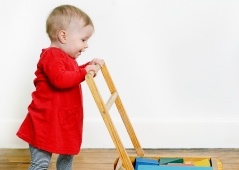Diarrhoea /
Toddlers Diarrhoea
01 Clinicians Tools and Resources
Review Toddler diarrhoea: is it a useful diagnostic label?
Arch Dis Child doi:10.1136/adc.2010.191825
C V E Powell1, H R Jenkins2
1Department of General Paediatrics, The Children's Hospital for Wales, Cardiff, UK
2Department of Child Health, The Children's Hospital for Wales, Cardiff, UK
http://adc.bmj.com/content/early/2011/08/09/adc.2010.191825.abstract
Abstract
Toddler diarrhoea is a term coined many years ago to describe a young child who passes several loose stools a day but who is otherwise healthy with excellent growth and normal examination. It could be argued that it is not an appropriate diagnostic term as it potentially stops the clinician from thinking about the possible causes of loose stools in this clinical situation. This article, which follows a debate between the authors on the topic at the 2010 Royal College of Paediatrics and Child Health Annual meeting, discusses the differential diagnoses of a young child presenting with the so-called toddler diarrhoea.
Suggested initial investigations
▶ Full blood count
▶ C reactive protein
▶ Erythrocyte sedimentation rate
▶ Coeliac disease screen—anti-tissue transglutaminase antibody and total serum IgA
▶ Stool culture (including Clostridium difficile and giardia)
Management strategies
▶ A 6-week trial of a cow's milk- and egg-free diet with dietetic help
▶ Reduce fructose/juice intake
▶ Trial of metronidazole
▶ Loperamide for symptomatic relief once other diagnoses are excluded
▶ Reassurance
▶ Follow-up
The information is not intended to take the place of medical advice.
Please seek advice from a qualified healthcare professional.
Read our terms and conditions
Last updated: 29/11/2011

